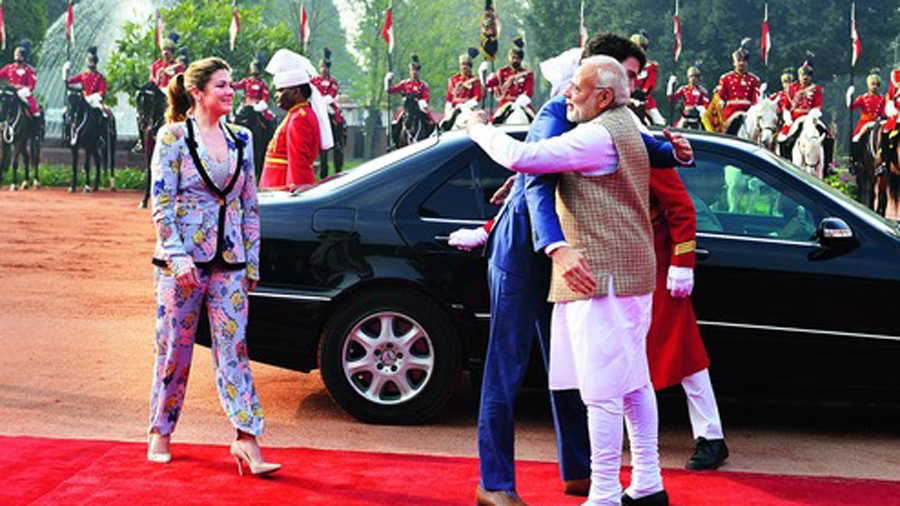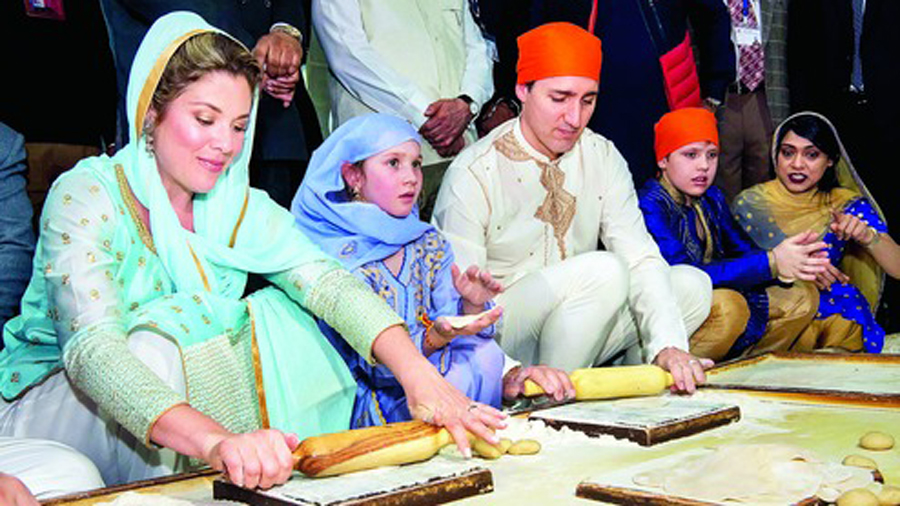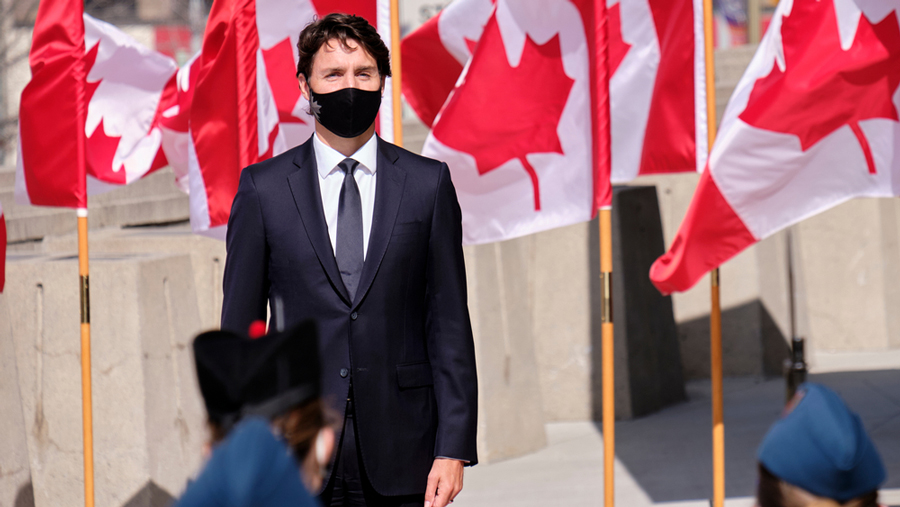India’s external affairs ministry on Tuesday slammed Canadian Prime Minister Justin Trudeau for voicing concern about security forces’ treatment of farmers protesting against the government’s new pro-market agricultural law.
Trudeau’s comments threatened to sink relations between the two countries to a fresh low after the Canadian prime minister’s gaffe-ridden official visit to India two years ago.
The External Affairs Ministry Spokesman Anurag Srivastava branded Trudeau’s statements “ill-informed” and added that the remarks were “unwarranted, especially when pertaining to the internal affairs of a democratic country".
Trudeau told Canada’s half-million-strong Sikh community in an online message on Monday marking Guru Nanak Dev’s birthday that he would be “remiss” if he didn’t take note of “news coming out of India” about the farmers’ protest.
“The situation is concerning. We’re all very worried about family and friends,” Trudeau said. “Let me remind you. Canada will always be there to defend the right of peaceful protest. We believe in the importance of dialogue and that is why we have reached out through multiple means directly to Indian authorities to highlight our concerns,” he added.
Srivastava insisted Canada shouldn’t involve itself in the protests, adding: "It is also best that diplomatic conversations are not misrepresented for political purposes" as farmers continued to arrive in trucks, buses and tractors and cause traffic chaos on the border of New Delhi and Haryana.

Canadian Prime Minister Justin Trudeau finally got on the penultimate day of his eight-day India visit what had been noticeably missing - the Modi hug. PTI file photo
Further toll on Indo-Canadian diplomacy
Trudeau’s comments mark a new setback in ties between Ottawa and New Delhi which has long been sensitive about what it sees as Canada’s failure to rein in radical Sikhs living in the country who are plotting the creation of an independent Khalistan.
The sit-in has sparked clashes between security forces and protesters with police firing tear gas and water cannons. A three-member cabinet team began talks Tuesday afternoon with farmers representatives amid the intensifying protests against the new law aimed at streamlining India’s inefficient food supply chain.
The legislation cuts out the middleman and allows farmers to sell their produce to any buyer and not just at government-regulated wholesale markets where they are guaranteed a minimum price. But farmers, especially the poor, smaller ones who make up the vast majority of growers, fear losing price supports for key staples such as wheat and rice.
The protests began with demonstrations by farmers from the grain-bowl states of Punjab and Haryana. But during the weekend farmers from Uttar Pradesh, Andhra Pradesh, Tamil Nadu and Kerala also staged demonstrations.
Adding fuel to the Indo-Canadian diplomatic fire, Canada’s defence minister Harjit Singh Sajjan tweeted that “reports of peaceful protesters being brutalised are very troubling… healthy democracies allow peaceful protest” while Jagmeet Singh, leader of the left-wing New Democratic Party called “the violence perpetrated against farmers peacefully protesting is appalling” and said he stood “in solidarity with farmers from Punjab and across India.”

Justin Trudeau, his wife Sophie Grégoire and their daughter, Ella Grace, help prepare the langar at the Golden Temple in Amritsar. PTI file photo
Sikh separatism and Canadian politics
The Canadian politicians’ closeness toward the country’s Sikh community is all about vote-bank politics with all three national parties -- Liberal, Conservative and New Democrats, playing the game. There are 1.2 million Indo-Canadians and the Sikh community makes up 470,000 of them.
Relations between Canada and India still haven’t recovered from Trudeau’s ill-fated weeklong visit to the subcontinent when he and his family outfitted themselves in elaborate Indian garb more suited for a Bollywood wedding than a state visit. The Trudeau family’s attire attracted some good-natured ridicule both in Canada and in India with critics saying it was an example of political correctness in overdrive.
But the mood turned sour when it turned out a Canadian Sikh separatist Jaspal Atwal, convicted of the attempted murder of Punjab cabinet minister Malkiat Singh Sidhu on a visit to Vancouver in 1986, had been on the guest list for official events on Trudeau’s Indian trip. The affair initially was passed off as an invitation list blooper. But then Trudeau’s office ratcheted up the matter, telling reporters that Indian agents had conspired to get Atwal invited to humiliate Canada over its perceived softness on Sikh separatists. That theory, dismissed as preposterous by the Canadian media and by the Indian government, cast a further shadow over what had been billed as an economic and cultural partnership-building visit by the prime minister.
Canada’s perceived permissive stance toward potential pro-Khalistan troublemakers has cast a shadow over Indo-Canadian relations for decades.
Separatist fervour has waned in Punjab. But Sikh separatism remains a live political issue among pro-Khalistan sympathisers in Canada where many Sikhs emigrated to in India’s turbulent 1980s. In 1985, Canadian Sikh terrorists blew a Mumbai-bound Air India plane out of the sky in 1985, killing all 329 people aboard.
Sikhs, while totalling 470,000 of Canada’s 36 million population, represent the largest group among Indian-origin Canadians and are concentrated in certain constituencies.
The Canadian media has asked questions from time to time about whether the government is too close to Sikh separatists and is providing a haven for pro-Khalistan fundraisers, gunrunners and extremists. Trudeau in 2017 addressed a Toronto parade for ‘Khalsa Day’, which included floats glorifying Sikh militant Bhindranwale and Khalistan flags.
Last year, ahead of Canada’s federal election that Trudeau narrowly won, the federal government removed direct references to “Sikh extremism” in a terrorism threat report. Critics blasted the move as a bid by the government to cater to Canadian Sikh voters in the leadup to the polls. The government report was reworded to mention the threat posed by “extremists who support violent means to establish an independent state within India,” a reference to the Khalistan movement.
Two months ago, the McDonald Laurier Institute, a Canadian think-tank, published a report accusing Pakistan of fuelling the Khalistan movement in Canada. It said the "the Khalistan movement has been going nowhere in the Sikhs' home state” but , was “kept alive in Canada by thugs and political hustlers unbothered by the innocent lives that have been lost in its name.”
Penny MacRae is a longtime writer on Canadian politics










